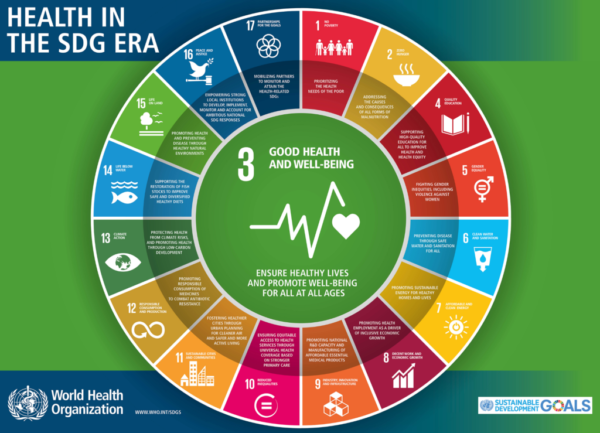Democratising public health and urban sustainability: How can nexus framings be useful?
Saurabh Arora (SPRU, University of Sussex, UK) and Leandro Giatti (SPH, USP, Brazil)

Public health and urban sustainability are inextricably linked. The World Health Organization (WHO) has emphasized this, drawing attention to the critical interdependence of the UN’s third Sustainable Development Goal (SDG) – ‘good health and well-being’ – with ‘sustainable cities and communities’ and all other SDGs, including ‘no poverty’ and ‘reduced inequalities’ (see Figure 1).
Such an emphasis on the relationship between public health and urban sustainability (and poverty/inequality) is not new – it has long been the staple of research and advocacy in cities. This work, among others, has highlighted ‘social determinants of health’ by recognizing the conditions under which money, power, and resources are unequally distributed.
Equitable access to public health is considered contingent on policies targeting a diversity of sectoral interventions (PDF), including the provision of nutritious food, clean water and energy. While this multi-sectoral focus is very pertinent, it is critical to direct greater attention towards the complexity of cross-sectoral connections between health, food, water, energy and the urban environment.Such an emphasis on the relationship between public health and urban sustainability (and poverty/inequality) is not new – it has long been the staple of research and advocacy in cities. This work, among others, has highlighted ‘social determinants of health’ by recognizing the conditions under which money, power, and resources are unequally distributed.
URBAN ECOLOGY
It is widely accepted that public health exclusions and injustices are inseparable from air pollution, water contamination and other unsustainable environmental issues. Conversely, urban sustainability ‘provisions’ such as green public spaces, can be crucial for improving poor people’s health and wellbeing. However, the accession of land for green spaces (e.g. city parks) can be based on evicting the poor from their homes, jeopardizing their access to public health, clean water, food and energy.
The consideration of ecological sustainability concerns thus adds complexity to the cross-sectoral links between public health and water, energy and food for the urban poor and marginalised. These complex connections can manifest as trade-offs, as in the above example of land accessions for city parks. They can also appear as synergies — for example, when access to clean water and energy allows people to eat cooked food, thereby making equitable public health more attainable.
NEXUS FRAMINGS
In the last decade, trade-offs and (potential) synergies between water, energy, food and the environment (WEFE) have been increasingly framed using the notion of the nexus. In general, nexus framings point to the limitations of siloed approaches to policymaking for addressing global challenges in provisioning water, energy, food and ecosystem services. To address the limitations, nexus scholars call for greater integration between different academic disciplines, policy silos and economic sectors.

One prominent proposal for achieving this integration is through the valuation of resources. Here, monetary value is attached to all WEFE resources. As a result, for example, one cubic metre of water can be shown to be approximately as valuable as 30 KWh of electric energy. This equivalence presents water and electricity as mutually interchangeable, as if urban households’ drinking water needs can be substituted with access to electricity.
This approach also suggests that water can be directed towards higher value activities such as the production of electricity in hydro-power stations, or to irrigate green spaces in the city, away from poor households (and peri-urban farming). Such forms of integration can also exacerbate urban inequalities and exclusions by extending the power of those who control and deploy, from above, the techniques and knowledges for performing integration of socio-economic sectors and policy silos.
While it is clear that integration is no panacea, and any insights on integration must be approached cautiously, the renewed emphasis of nexus framings on WEFE interdependencies can nevertheless be useful for bringing hidden complexities to the fore. It might even help open up political possibilities toward deepening the democratization of public health.
POLITICAL COMPLEXITIES
Moving beyond integration, in our own Resnexus project, we are contributing to a nascent literature on bottom-up approaches to WEFE interdependencies. Collectively, these approaches emphasize how any trade-offs and synergies must be viewed politically, at least in the following three ways:
- coexistence of multiple divergent framings of trade-offs and synergies, meaning that one actor’s synergies may be another’s trade-offs;
- pressures to order the different framings hierarchically, according to their relative importance and legitimacy, assessed using criteria that may be epistemological, economic, industrial, ethical and/or environmental, with the eventual aim of narrowing down preferred courses of action;
- negotiations and struggles to sustain or extend the multiplicity and divergence of possible courses of (policy) action and associated framings.
For its realization, the third approach outlined here generally relies on social movements in which agency for tackling inequalities and exclusions is distributed across many actors. Such social movements articulate different subjects, different agendas and different identities. In fact, their success and survival may depend on articulations across differences.
DEMOCRATIZING PUBLIC HEALTH?
If democracy in a broad sense is considered as ‘access by the least powerful to the capacity for challenging power’ in all its forms and concentrations, what implications do the bottom-up nexus framings carry for deepening democratization of public health? We believe there are at least three benefits to deeper engagement of nexus framings with public health research and advocacy.
First, rather than exploring the interdependence of public health with food or water or energy orthe environment, nexus framings fruitfully direct attention to complex webs of relations between WEFE and public health to reduce vulnerabilities by addressing multiple social and ecological determinants of health.
Second, attention to complex webs of relations is not the same thing as greater integration between different silos and sectors. Instead, such attention points to multiple divergent framings of trade-offs and synergies between water, food, energy, the environment and public health, which are all differently experienced and accessed by people depending on intersections of class, race, gender, sexuality and disability.
Third, the multiplicity and diversity of framings are always under pressure of closing down by and for power, limiting the possible courses of action implicated in the framings. Public policies and scholarly knowledge must therefore open up new possibilities by helping to create and nurture social movements for achieving democratic transformations.
Such democratic transformations involve diverse courses of action and associated framings by and for vulnerable and poor people, to enable cross-sectoral and cross-silo provisioning of public health in cities.
This blog, drawing on some of the work of the ESRC Social, Technological and Environmental Pathways to Sustainability (STEPS) Centre, was originally posted on the STEPS Centre website.